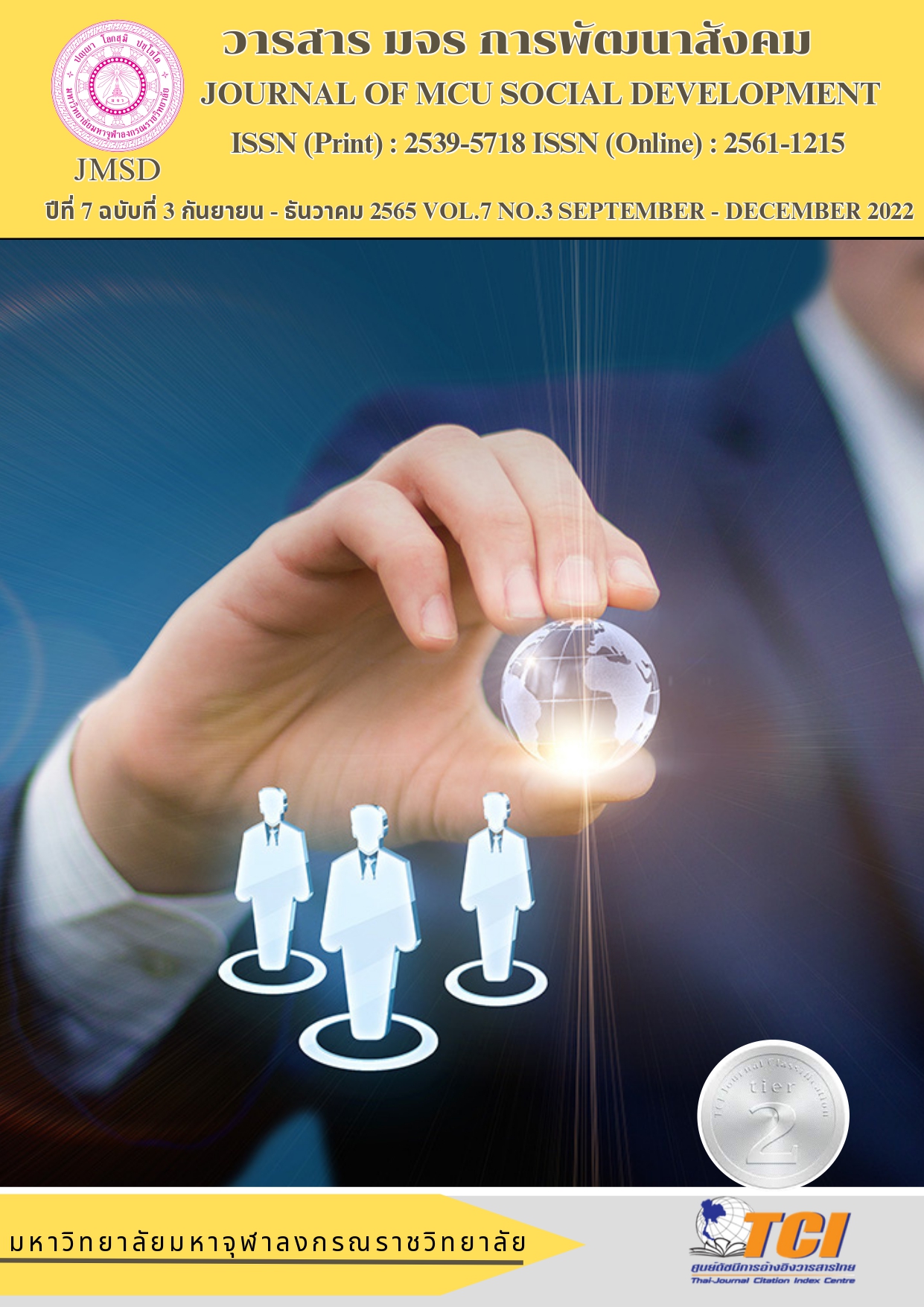ประสิทธิภาพการบริหารองค์กรด้านการท่องเที่ยวด้วยเทคโนโลยีดิจิทัล
คำสำคัญ:
ประสิทธิภาพการบริหารองค์กร, การพัฒนาท้องถิ่นด้านการท่องเที่ยว, นักท่องเที่ยวชาวต่างชาติ, เทคโนโลยีดิจิทัลบทคัดย่อ
งานวิจัยครั้งนี้มีวัตถุประสงค์เพื่อศึกษาอิทธิพลเส้นทางความสัมพันธ์ของปัจจัยด้านชีวสังคม การให้บริการผ่านเว็บไซต์ สังคมออนไลน์ การตอบสนองความต้องการเฉพาะบุคคล ที่ส่งผลต่อประสิทธิการบริหารองค์กรด้านการท่องเที่ยวของนักท่องเที่ยวชาวต่างชาติ โดยผู้วิจัยได้ดำการวิจัยแบบผสม คือการวิจัยเชิงปริมาณเป็นตัวนำ ซึ่งผู้วิจัยใช้แบบสอบถามเป็นเครื่องมือการวิจัย มีกลุ่มตัวอย่างเป็นนักท่องเที่ยวชาวต่างชาติที่เดินทางท่องเที่ยวประเทศไทย จำนวน 500 ราย ใช้สถิติการวิเคราะห์เส้นทางความสัมพันธ์เพื่อหาอิทธิพลของความสัมพันธ์ นอกจากนี้ผู้วิจัยยังใช้การวิจัยเชิงคุณภาพ โดยใช้วิธีการสัมภาษณ์เป็นเครื่องมือการวิจัยกับกลุ่มตัวอย่าง เพื่อปิดช่องว่างของการวิจัยและเสริมการวิจัยเชิงปริมาณให้มีความสมบูรณ์มากยิ่งขึ้น
ผลการวิเคราะห์อิทธิพลของความสัมพันธ์ พบว่า ปัจจัยด้านสังคมออนไลน์มีอิทธิพลความสัมพันธ์สูงสุดต่อประสิทธิภาพการบริหารองค์กรด้านการท่องเที่ยวของนักท่องเที่ยวชาวต่างชาติ และปัจจัยด้านสังคมออนไลน์ยังร่วมกันกับปัจจัยการตอบสนองความต้องการเฉพาะบุคคลที่ส่งอิทธิพลความสัมพันธ์ต่อประสิทธิการบริหารองค์กรด้านการท่องเที่ยวของนักท่องเที่ยวชาวต่างชาติ โดยผลการวิจัยดังกล่าวได้สอดคล้องกับงานวิจัยเชิงคุณภาพ พบว่า การเดินทางท่องเที่ยวของนักท่องเที่ยวชาวต่างชาติมีแรงบันดาลใจจากสังคมออนไลน์ ภายใต้การสนับสนุนของเว็บไซต์ในการตอบสนองความต้องการด้านต่างๆ ดังนั้น ปัจจัยดังกล่าวจึงมีอิทธิพลและเป็นส่วนสำคัญต่อประสิทธิภาพการบริหารองค์กรด้านการท่องเที่ยวด้วยเทคโนโลยีดิจิทัล
เอกสารอ้างอิง
Byrne, B.M. (2009), Structural Equation Modeling with AMOS: Basic Concepts, Applications, and Programming;. London: Routledge.
Carol, X. O. & Choon, L. S. (2003). Customer loyalty strategy in the internet era. Pacific Asia Conference on Information Systems (1734-1744), 10-13 July 2003, Adelaide, South Australia.
Chavalier, A. & Ivory, M. Y. (2003). Web designs: Influences of designer’s expertise and constraints. International Journal of Human-Computer Studies, 58, 57-87.
Cheng, M. K. & Lee, M. K. O. (2006). Understanding consumer trust in internet shopping: A multidisciplinary approach. Journal of the American Society for Information -Science and Technology, 57(4), 479-492.
Cronbach, L.J. (1990). Coefficient Alpha and The Internal Structure of Tests. Psychometrika.
Ersoy, N., & Calik, N. (2010). Brand loyalty: Emotional devotion or rational behavior-A study on mobile telephones from Eskisehir, Turkey. The Business Review, Cambridge, 15(1), 212.
Jetsalid Angsukanjanakul. (2017). Modeling Sustainable Management for Community based Tourism: A Case Study of Floating Markets in the Lower Central Thailand. International Journal of Management and Applied Science, 3(1), 43-46.
Kish, L. (1965). Survey Sampling. New York: John Wiley and Sons Inc.
Kuo, H. M., Hwang, S. L., & Wang, M. Y. (2004). Evaluation research of information and supporting interface in electronic commerce web sites. Information and Management, 41(3), 377-397.
National Statistic Office Ministry of Information and Communication Technology. Available online: http://web.nso.go.th/index.htm (accessed on 5 December 2021).
Office of the National Economic and Social Development Council (NESDC). Available online: http://www.nesdb.go.th/nesdb_en/more_news.php?cid=154&filename=index (accessed on 5 December 2021).
Srinivasan S., Rolph, A. & Kishore, P. (2002). Customer loyalty in e-commerce: An exploration of its antecedents and consequences. Journal of Retailing, 78, 41-50.
Sugiyama, K. & Andree, T. (2010). The Dentsu way: Secrets of cross switch marketing from the world’s most innovative advertising agency. New York: McGraw-Hill.
Sutthichaimethee, P., Ariyasajjakorn, D. A (2020), Forecasting Model on Carrying Capacity for Government’s Controlling Measure under Environmental Law in Thailand: Adapting Non-recursive Autoregression Based on the Var-X Model. International Journal of Energy Economics and Policy, 10, 645-655.
Sutthichaimethee, P., Chatchorfa, A., Suyaprom, S. (2019), A Forecasting Model for Economic Growth and CO2 Emission Based on Industry 4.0 Political Policy under the Government Power: Adapting a Second-Order Autoregressive-SEM. J. Open Innov. Technol. Mark. Complex., 5, 69.
Sutthichaimethee, P., Dockthaisong, B. (2018), A Relationship of Causal Factors in the Economic, Social, and Environmental Aspects Affecting the Implementation of Sustainability Policy in Thailand: Enriching the Path Analysis Based on a GMM Model. Resources, 7, 87.
World Tourism Organization. (2011). Travel and Tourism 2011, World travel and tourism council, London, UK.
Xu, S., Mingzhu, L., Bu, N., & Pan, S. (2017). Regulatory frameworks for ecotourism: An application of Total Relationship Flow Management Theorems. Tourism Management., 61, 321-330.
ดาวน์โหลด
เผยแพร่แล้ว
รูปแบบการอ้างอิง
ฉบับ
ประเภทบทความ
สัญญาอนุญาต
ลิขสิทธิ์ (c) 2022 มจร การพัฒนาสังคม

อนุญาตภายใต้เงื่อนไข Creative Commons Attribution-NonCommercial-NoDerivatives 4.0 International License.



